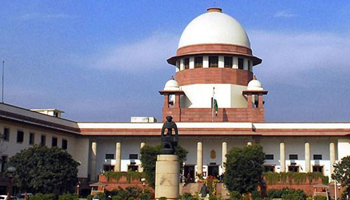Right to privacy should be on case-to-case basis, says Supreme Court
Mangalore Today News Network
New Delhi, July 21, 2017: Right to privacy could be determined from a case-to-case basis, the Supreme Court observed on Thursday. A nine-judge Constitution bench, headed by Chief Justice J S Khehar, said that privacy cannot be an absolute right and the state may have some power to put restrictions.
 The bench was revisiting the top court’s 55 year-old judgment that states privacy is not a basic fundamental right for citizens.
The bench was revisiting the top court’s 55 year-old judgment that states privacy is not a basic fundamental right for citizens.
"Right to privacy is an amorphous right and not absolute. It is only a small sub-sect of liberty," said the bench.
The nine-member bench comprised of Justices J Chelameswar, S A Bobde, R K Agrawal, Rohinton Fali Nariman, Abhay Manohar Sapre, D Y Chandrachud, Sanjay Kishan Kaul and S Abdul Nazeer.
"In a technologically dynamic society it is imperative to keep dimensions of right to privacy flexible to adapt and adjust with the new scenarios," it said, adding many of the fundamental rights "cannot be enjoyed to the fullest in the absence of right to privacy", as reported by the PTI.
The bench then referred to NGO Naz Foundation’s case of decriminalising consensual gay sex among lesbians, gays, bisexuals and transgenders, saying that the verdict "would become vulnerable".
The top court also referred to the issue of data protection in today’s world of big data where operators have access to all details of consumers, including fingerprints.
"We live in an age of big data and the state is entitled to regulate the data whether it is for the purpose of regulating crime, taxation or other activities... Right to privacy cannot be so absolute that it prevents the State from legislating or regulating it," the bench said.
"If I decide to co-habit with my wife, police can’t barge into my bedroom. That’s my privacy. Whether to send my children to school is not privacy because I have to send them to school under the Right to Education law," said Justice Chandrachud.
Senior advocate Gopal Subramanium, arguing on behalf of the petitioners, said right to privacy is a pre-existing "natural right" which the Constitution acknowledged and guaranteed to the citizens in case of infringements by the State.
Courtesy: Zeenews
- Sullia: College student ends life
- Man collapses to death after alleged assault by veterinarian
- Super Mom 2024 celebration: A Heartfelt tribute to Motherhood
- Former BJP MLA Raghupathi Bhat decides to contest as independent candidate
- MRPL to upgrade amenities for commuters
- Kasargod: Five injured in bus-lorry collision
- Mangaluru: Kannada actress fined for traffic rule violation scene in TV serial
- Residential school in Surathkal records 100% success, defyining past failures
- Puttur: Family seeks "Spirit groom" for daughter who died 30 yrs ago, gives matrimonial Ad
- Strong winds uproot tree on Shiradi Ghat stretch; traffic disrupted
- Car overturns near Kalladka during heavy rains
- Driver loses control over Bolero as elephant crosses path at Charmady Ghat
- Several parts of DK receive rainfall; 7 houses damaged due to strong winds, tree fall
- PM Modi files nomination from Varanasi Lok Sabha seat
- Delhi man takes 200 flights in a year, steals passengers’ valuables, arrested
- New Covid sub-variant no cause for concern in Karnataka: Experts
- Indian national pleads guilty to attacking White House with truck
- 2 Suspected Bangladeshi terrorists arrested from Guwahati railway station
- Sushil Modi, ex Deputy Chief Minister of Bihar, dies at 72
- Article 370 enabled aspirations of people: PM lauds high voter turnout in Srinagar
- 14 Dead, 60 injured after huge billboard falls during Mumbai dust storm
- 67.25% polling in 96 seats across 9 states, J&K
- Karnataka sex scandal: HD Revanna gets conditional bail in kidnapping case
- Video: MLA from Jagan Reddy’s party slaps voter in polling queue, he hits back
- BJP’s Madhavi Latha asks Muslim women to show face for ID check, sparks row
- New residential complex for the judges inaugurated in Mangaluru
- Absconding accused nabbed after 8 years
- Truck with cylinders turns turtle in Beltangady
- Bhoota Kola artist dies of cardiac arrest
- Development of the country should be our goal: Ganesh Karnik
- Container truck gets stuck under Modankap railway bridge
- Truck crushes bike’s pillion rider near BC Road
- Head constable dies of heart attack
- Udupi: PDO dismissed over financial irregularities
- CREDAI to resume Skill Development Program for Construction Workers in Mangaluru
- John B Monteiro elected president of Rachana Catholic Chamber of Commerce & Industry
- Sudhanshu Rai elected district president of All College Student Association
- Chief Minister to visit Mangaluru, Udupi on August 1
- Nitte University awards PhD degree to Tina Sheetal D’Souza
- Sachitha Nandagopal honoured by CMTAI for Community Service
- CITY INFORMATION
- TRAVEL
- TOURIST INFORMATION
- HEALTH CARE
- MISCELLANEOUS




 Write Comment
Write Comment E-Mail To a Friend
E-Mail To a Friend Facebook
Facebook Twitter
Twitter  Print
Print 

